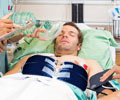During a cardiac arrest earlier epinephrine treatment is associated with better recovery compared to later treatment, stated research.

‘According to the American Heart Association’s Heart and Stroke Statistical Update 2021, each year more than 356,000 people have a cardiac arrest outside of a hospital setting in the U.S.’





“Our study’s findings should guide emergency medical services professionals towards earlier administration of epinephrine during out-of-hospital cardiac arrest management,” said lead study author Shengyuan Luo, M.D., M.H.S., an internal medicine resident physician at Rush University Medical Center in Chicago. Unlike a heart attack, which results from blocked blood vessels, a cardiac arrest occurs when the heart suddenly stops beating due to a malfunction in the rhythm of the heartbeat. Although a cardiac arrest can result from a heart attack, it also can occur on its own and without a prior diagnosis of heart disease. Visible signs of cardiac arrest include unresponsiveness and undetectable or abnormal breathing, such as gasping.
Previous research found that only about 1 in 5 people survive a cardiac arrest outside of the hospital and those who do survive often have long-term impairment in the ability to perform daily living tasks.
During a cardiac arrest, immediate CPR, or cardiopulmonary resuscitation, is critical. For some types of cardiac arrest, an AED, or automated external defibrillator, also is used to deliver an electric shock through the chest to the heart to restore a heartbeat. For these “shockable” cardiac arrests, the hormone epinephrine, also known as adrenaline, is injected to help restore blood flow. Previous research indicated that epinephrine should be given after three unsuccessful electric shocks with an AED, however, it was unclear whether it should be given even earlier – such as after the first electric shock.
To compare the effects of earlier versus later administration of epinephrine, the researchers examined medical records to compare epinephrine timing to patient recovery. Study subjects included 6,416 multi-ethnic adults across North America who had an out of hospital cardiac arrest with shockable initial rhythm from 2011-2015. They were an average age of 64 years, and most were men.
Advertisement
“It is crucial that whenever a cardiac arrest event is suspected, the emergency medical system be notified and activated immediately, so that people with cardiac arrest receive timely, life-saving medical care,” Luo said.
Advertisement
Although this study found an association between earlier epinephrine administration and better recovery after cardiac arrest, it could not account for other influences on recovery. To confirm the study’s findings, additional research accounting for other potential influences is needed.
Source-Eurekalert















